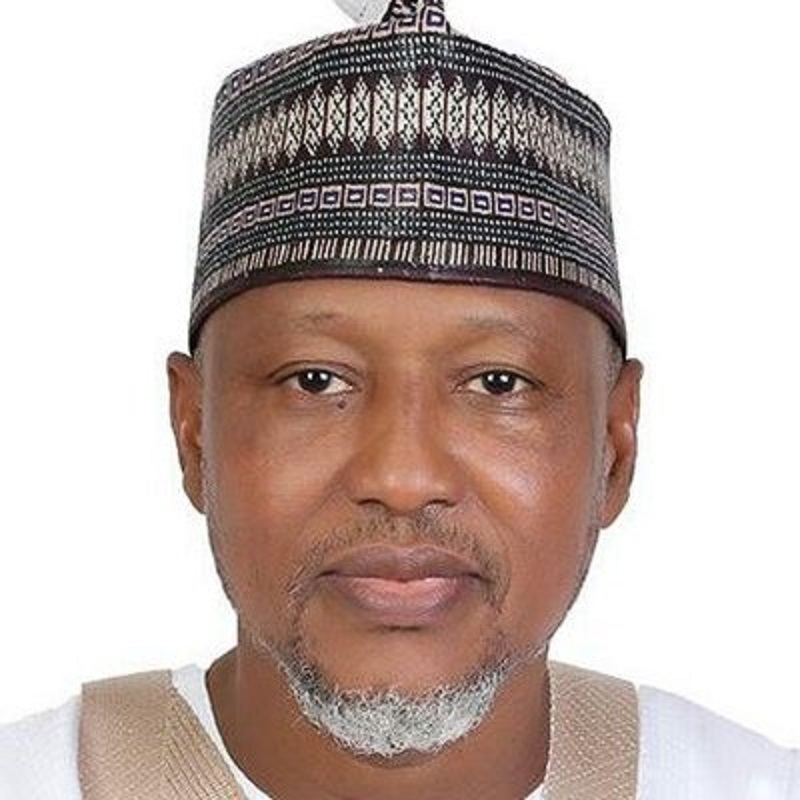Economy
ISB Confers SEC New Investigative, Enforcement Powers—Lawmaker

By Aduragbemi Omiyale
The Chairman of the House of Representatives Committee on Capital Markets and Institutions, Mr Babangida Ibrahim, has disclosed that the Investments and Securities Bill (ISB) recently passed by the upper chamber of the National Assembly has conferred the Securities and Exchange Commission (SEC) new powers to investigate capital market infractions and apply sanctions to culprits.
Speaking in an interview in Abuja recently, the lawmaker said this is one of the advantages of the new piece of legislature, which is awaiting passage in the Senate.
According to him, the bill has provisions that will inspire the confidence of both local and foreign investors as they can be assured that the regulators have been sufficiently empowered to deal with malpractices that undermine confidence in the market.
Mr Ibrahim stated that foreign investors and market participants would also be attracted to the Nigerian market because they will have comfort in the fact that the Bill seeks to mirror standard investor-protective provisions and practices in advanced jurisdictions, which the foreign participants are already familiar with.
On the reason for the new bill, the lawmaker stated that the current enabling law for the Nigerian capital market, the Investments and Securities Act, No. 29 of 2007 (ISA), was signed into law by late President Umar Musa Yar’adua in June 2007 (15 and half years ago) before the global financial crisis of 2008/2009.
Global financial regulators, he said, have made major changes in their regulatory instruments following the crisis to address some of the obvious gaps that contributed to the global economic disruption of the time, adding that such global shifts and other current trends in capital markets regulation have made it imperative to make major improvements to the Act to align our market with international standards.
According to him, the bill seeks to repeal the ISA and introduce new provisions that empower the SEC to collaborate with other regulatory bodies in the financial sector to manage and mitigate systemic risks as it confers new investigative and enforcement powers on the apex regulator, SEC, to effectively regulate the Nigerian capital market. It introduces the framework for the regulation of new products, including financial and commodities derivatives and financial market infrastructures, which are expected to lead to increased activities, and, thus, deepen the Nigerian capital market.
“The bill introduces stiffer sanctions in the form of increased fines and jail terms, which are commensurate with the severity of offences, and also serve as deterrence to potential future offenders.
“For instance, a jail term of not less than 10 years has been provided to address the menace of Ponzi schemes and illegal investment schemes that have caused heartache for thousands of Nigerians who have been victims of such scams. Other offences, such as market manipulation, insider trading, false statements in prospectuses etc. are also subject to severe punishment.
“The bill will ensure the diversification of the Nigerian economy away from a mono-product oil economy through the strengthening of the Nigerian commodities ecosystem with the trading of warehouse receipts and commodities contracts on the commodities exchanges.
“The bill also contains a legal framework for registration and regulation of new types of critical market infrastructures such as central counterparties, which will be responsible for managing the risks emanating from transactions in derivatives and other financial instruments, thereby ensuring the safety and integrity of our markets and boosting investors’ confidence,” he stated.
The lawmaker disclosed that federal government agencies, subnational, and supranational will be able to better access the capital market for both revenue bonds and project-tied bonds as the bill now contains adequate provisions that enable both corporates and governments to issue new instruments to develop the infrastructural requirements of the country.
According to him, “The bill will generally revitalize the Nigerian capital market, as it introduces regulation of new businesses, products and services that will deepen the market while equipping the apex regulator with appropriate powers to protect the market and enforce the provisions of the bill.
“In every sense of the word, this bill is truly a market-inspired bill. Inputs were received from all segments of the Nigerian capital market – the securities exchanges, commodities exchanges, the central counterparties, capital market operators and trade associations, chartered institute of stockbrokers, capital market professionals such as the legal practitioners as well as shareholders associations.”
Economy
Naira Down Again at NAFEX, Trades N1,359/$1

By Adedapo Adesanya
The Naira further weakened against the Dollar in the Nigerian Autonomous Foreign Exchange Market (NAFEX) for the fourth straight session this week on Thursday, February 26.
At the official market yesterday, the Nigerian Naira lost N3.71 or 0.27 per cent to trade at N1,359.82/$1 compared with the previous session’s N1,356.11/$1.
In the same vein, the local currency depreciated against the Pound Sterling in the same market window on Thursday by N8.27 to close at N1,843.23/£1 versus Wednesday’s closing price of N1,834.96/£1, and against the Euro, it crashed by N8.30 to quote at N1,606.89/€1, in contrast to the midweek’s closing price of N1,598.59/€1.
But at the GTBank forex desk, the exchange rate of the Naira to the Dollar remained unchanged at N1,367/$1, and also at the parallel market, it maintained stability at N1,365/$1.
The continuation of the decline of the Nigerian currency is attributed to a surge in foreign payments that have outpaced the available Dollars in the FX market.
In a move to address the ongoing shortfall at the official window, the Central Bank of Nigeria (CBN) intervened by selling $100 million to banks and dealers on Tuesday.
However, the FX support failed to reverse the trend, though analysts see no cause for alarm, given that the authority recently mopped up foreign currency to achieve balance and it is still within the expected trading range of N1,350 and N1,450/$1.
As for the cryptocurrency market, major tokens posted losses over the last 24 hours as traders continued to de-risk alongside equities following Nvidia’s earnings-driven pullback, with Ripple (XRP) down by 2.7 per cent to $1.40, and Dogecoin (DOGE) down by 1.6 per cent to $0.0098.
Further, Litecoin (LTC) declined by 1.3 per cent to $55.87, Ethereum (ETH) slipped by 0.9 per cent to $2,036.89, Bitcoin (BTC) tumbled by 0.7 per cent to $67,708.21, Cardano (ADA) slumped by 0.6 per cent to $0.2924, and Solana (SOL) depreciated by 0.4 per cent to $87.22, while Binance Coin (BNB) gained 0.4 per cent to sell for $629.95, with the US Dollar Tether (USDT) and the US Dollar Coin (USDC) closing flat at $1.00 each.
Economy
Crude Oil Falls as Geopolitical Risk Around Iran Clouds Supply Outlook

By Adedapo Adesanya
Crude oil settled lower on Thursday as investors tracked developments in talks between the United States and Iran over the latter’s nuclear programme, weighing potential supply concerns if hostilities escalate.
Brent crude futures lost 10 cents or 0.14 per cent to close at $70.75 a barrel, while the US West Texas Intermediate (WTI) crude futures depreciated by 21 cents or 0.32 per cent to $65.21 a barrel.
The US and Iran held indirect talks in Geneva on Thursday over their long-running nuclear dispute to avert a conflict after US President Donald Trump ordered a military build-up in the region.
Prices had gained earlier in the session after media reports indicated the talks had stalled over US insistence on zero enrichment of uranium by Iran, as well as a demand for the delivery of all 60 per cent-enriched uranium to the US.
However, prices then retreated after the two countries extended talks into next week, reducing the immediate strike potential.
Iran’s Foreign Minister, who confirmed talks will continue next week, said Thursday’s talks were the most serious exchanges with the US yet, saying Iran clearly laid out its demand for lifting sanctions and the process for relief.
His counterpart from Oman, who is handling the talks, said significant progress was made in Thursday’s talks. The Omani minister’s upbeat assessment followed indirect talks between Iranian Foreign Minister and US envoys Steve Witkoff and Jared Kushner in Geneva, with one session in the morning and the second in the afternoon.
He will also hold talks with US Vice President JD Vance and other US officials in Washington on Friday.
The Trump administration has insisted that Iran’s ballistic missile program and its support for armed groups in the region must be part of the negotiations.
The American President said on February 19 that Iran must make a deal in 10 to 15 days, warning that “really bad things” would otherwise happen.
On Tuesday, he briefly laid out his case for a possible attack on Iran in his State of the Union speech, underlining that while he preferred a diplomatic solution, he would not allow Iran to obtain a nuclear weapon.
Meanwhile, the US continues to amass forces in the Middle Eastern region, with the military saying it is prepared to execute orders given by the US President.
Economy
Why Transparency Matters in Your Choice of a Financial Broker

Choosing a Forex broker is essentially picking a partner to hold the wallet. In 2026, the market is flooded with flashy ads promising massive leverage and “zero fees,” but most of that is just noise. Real transparency is becoming a rare commodity. It isn’t just a corporate buzzword; it’s the only way a trader can be sure they aren’t playing against a stacked deck. If a broker’s operations are a black box, the trader is flying blind, which is a guaranteed way to blow an account.
The Scam of “Zero Commissions”
The first place transparency falls apart is in the pricing. Many brokers scream about “zero commissions” to get people through the door, but they aren’t running a charity. If they aren’t charging a flat fee, they are almost certainly hiding their profit in bloated spreads or “slippage.” A trader might hit buy at one price and get filled at a significantly worse one without any explanation. This acts as a silent tax on every trade. A transparent broker doesn’t hide the bill; they provide a live, auditable breakdown of costs so the trader can actually calculate their edge.
The Conflict of Market Making
It is vital to know who is on the other side of the screen. Many brokers act as “Market Makers,” which is a polite way of saying they win when the trader loses. This creates a massive conflict of interest. There is little incentive for a broker to provide fast execution if a client’s profit hurts their own bottom line. A broker with nothing to hide is open about using an ECN or STP model, simply passing orders to the big banks and taking a small, visible fee. If a broker refuses to disclose their execution model, they are likely betting against their own clients.
Regulation as a Safety Net
Transparency is worthless without an actual watchdog. A broker that values its reputation leads with its licenses from heavy-hitters like the FCA or ASIC. They don’t bury their regulatory status in the fine print or hide behind “offshore” jurisdictions with zero oversight. More importantly, they provide proof that client funds are kept in segregated accounts. This ensures that if the broker goes bust, the money doesn’t go to their creditors—it stays with the trader. Without this level of openness, capital is essentially unprotected.
The Withdrawal Litmus Test
The ultimate test of a broker’s transparency is how they handle the exit. There are countless horror stories of traders growing an account only to find that “technical errors” or vague “bonus terms” prevent them from withdrawing their money. A legitimate broker has clear, public rules for getting funds out and doesn’t hide behind a wall of unreturned emails. If a platform makes it difficult to see the exit strategy, it’s a sign that the front door should have stayed closed.
Conclusion
In 2026, honesty is the most valuable feature a broker can offer. It is the foundation that allows a trader to focus on the charts instead of worrying if their stops are being hunted. Finding a partner with clear pricing, honest execution, and real regulation is the first trade that has to be won. Flashy marketing is easy to find, but transparency is what actually keeps a trader in the game for the long haul.
-

 Feature/OPED6 years ago
Feature/OPED6 years agoDavos was Different this year
-
Travel/Tourism10 years ago
Lagos Seals Western Lodge Hotel In Ikorodu
-

 Showbiz3 years ago
Showbiz3 years agoEstranged Lover Releases Videos of Empress Njamah Bathing
-

 Banking8 years ago
Banking8 years agoSort Codes of GTBank Branches in Nigeria
-

 Economy3 years ago
Economy3 years agoSubsidy Removal: CNG at N130 Per Litre Cheaper Than Petrol—IPMAN
-

 Banking3 years ago
Banking3 years agoSort Codes of UBA Branches in Nigeria
-

 Banking3 years ago
Banking3 years agoFirst Bank Announces Planned Downtime
-

 Sports3 years ago
Sports3 years agoHighest Paid Nigerian Footballer – How Much Do Nigerian Footballers Earn





















